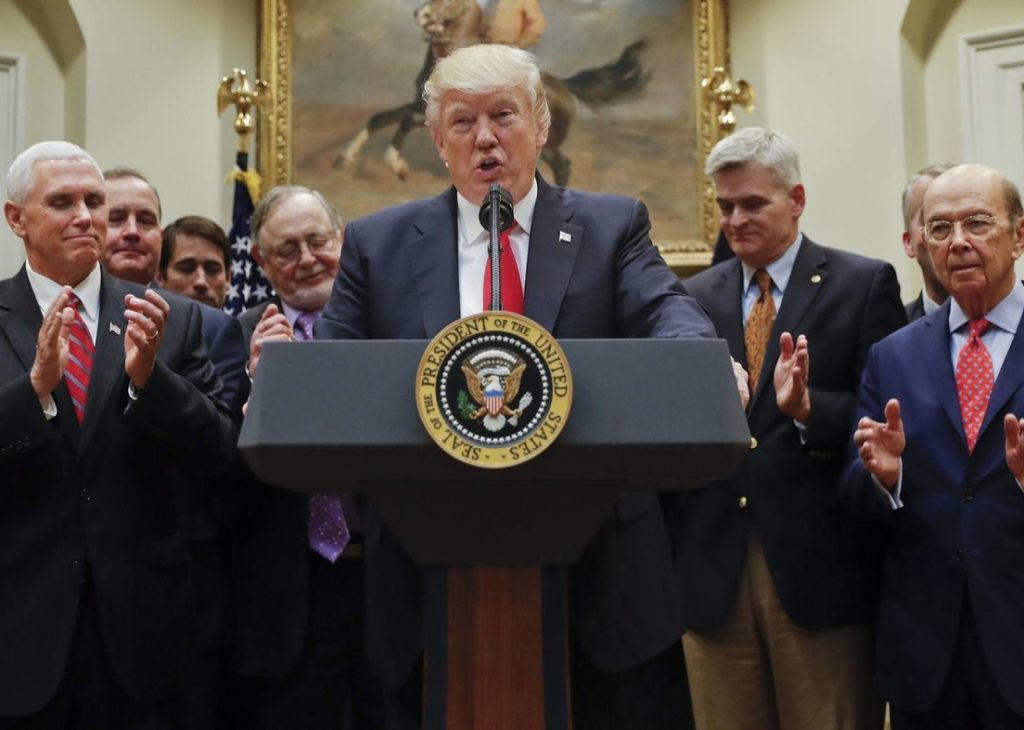Trump’s pursuit of ‘American energy dominance’ threatens the entire planet.

Trump’s pursuit of ‘American energy dominance’ threatens the entire planet
President Trump upended decades of U.S. policy that started with Richard Nixon when he declared that the goal of the United States was no longer “energy independence” but rather “American energy dominance.” This wasn’t Trumpian hyperbole. Few policies have been pursued by the administration with more cohesiveness, zeal, and success — or with more potential to yield great and lasting harm.
Trump has unleashed a massive, untethered expansion of oil, natural gas and coal production, designed to make this country the world’s foremost dirty energy powerhouse. The policy not only worsens catastrophic climate change, it pushes the U.S. into a small and increasingly isolated club of autocratic regimes intent on maintaining a global commitment to fossil fuels.
Interior Secretary Ryan Zinke laid out Trump’s energy policy in Secretarial Order 3351: “Achieving American energy dominance begins with recognizing that we have vast untapped domestic energy reserves. For too long America has been held back by burdensome regulations on our energy industry. The Department is committed to an America-first energy strategy.”
Trump’s policy brings the U.S. into a small and increasingly isolated club of autocratic regimes intent on maintaining a global commitment to fossil fuels.
Michael Nedd, then the acting director of the Bureau of Land Management, put it more succinctly: “We want to make the BLM a better business partner for the oil and gas industry.”
Just four days after his inauguration, Trump fast-tracked the Dakota Access oil pipeline. Within four months of its being operational, in June 2017, North Dakota reached an all-time record high of producing wells, followed less than one year later by the highest daily oil production in the state’s history.
In Trump’s first six months in office, expansive orders and rule changes across federal agencies resulted in a virtually frozen regulatory process, with nearly 300 federal regulations specifically related to energy production and environmental protection affecting public health, worker safety, tribal sovereignty and the climate rescinded, withdrawn, or otherwise stalled by mid 2017. Nor did the administration stop there.
The Environmental Protection Agency undid the Clean Power Plan and eliminated rules that regulated coal ash waste, required oil and gas companies to report and repair methane emissions, and limited toxic emissions from major industrial polluters. The EPA also took its climate change website offline, and Trump revoked several Obama-era executive orders on climate change.
Congress opened up drilling in the Arctic National Wildlife Refuge, and the Interior Department issued the first-ever oil production permits for federal waters in the Arctic. Ultimately, the plan is to open virtually all federal waters to oil and natural gas production. The department also rescinded rules that made offshore operations safer, put in place after the BP Deepwater Horizon disaster.
On coal, the Interior Department lifted a moratorium on new leases on federal lands, and by the end of 2017, six straight years of decline in U.S. coal production was reversed.
Early this year, the BLM changed its oil and gas leasing policy to limit public comment and environmental reviews, accelerate permitting, and expand leasing — making six times the amount of public land available compared to two years ago. As a result, the number of oil and natural gas wells on lands administered by the Interior Department increased by an astounding 85% from 2016 to 2017. With the onslaught of new activity, a BLM official in New Mexico admitted that his team lacks the resources to enforce the rules that remain, and locals report increasing violations that include oil spills.
Lawsuits and concerted organizing have limited some of the administration’s actions, but failed to halt the effects of its energy policy.Under Trump, the U.S. has broken its own record for the highest amount of oil and natural gas ever produced in, and exported out of, the country. The International Energy Agency recently predicted that the U.S. is on track to produce half of the world’s total oil and natural gas output by 2025.
At the same time, the president has failed to deliver on the promised benefits of “American energy dominance.” Instead of lower costs for U.S. consumers, the price of gasoline has been rising since 2016, and Thanksgiving drivers paid the highest pump prices in four years. After falling for two years, the price of electricity in 2017 was the highest in nearly 20 years, with 2018 on track to surpass it. And in place of “freedom from dependence on foreign oil,” U.S. imports of oil and natural gas are on the rise.
Instead, Trump has ushered the United States into a new oil bloc. Now, the United States, Russia and Saudi Arabia — not OPEC — dominate global oil supply. Energy strategist Julien Lee predicts that the actions of Trump, Russian President Vladimir Putin and Saudi Crown Prince Mohammed Bin Salman will determine the future course of oil prices.
Trump has prioritized alliances with these oppressive, autocratic regimes, which are aggressively undermining global action on climate change. They wanted a more fervent partner in their struggle to save fossil fuels, and Trump has obliged them, not least by withdrawing the U.S. from the Paris climate accord.
The White House is forcing the United States into greater dependence on fossil fuels, just as the world’s preeminent climate authority, the U.N. Intergovernmental Panel on Climate Change, has made clear how crucial it is to give them up. In its latest report, the IPCC calculates that humanity has only 12 years to act or pass a point of no return. We simply cannot allow Trump’s destructive policy to succeed.
Antonia Juhasz is an energy analyst, author and investigative journalist. Her most recent book is “Black Tide: the Devastating Impact of the Gulf Oil Spill.” @AntoniaJuhasz

 LOS ANGELES TIMES
LOS ANGELES TIMES